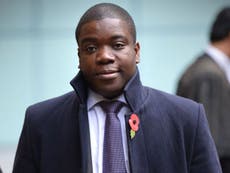The strange words of Britain's biggest rogue trader are a warning about the future of banks after Brexit
The authorities already seem sympathetic to the banking industry. How else to explain the decision last December by the Financial Conduct Authority to ditch its proposed inquiry into the culture, pay and behaviour of banking staff?

One of the great joys of winter is putting on a coat you last wore in March to discover a forgotten clutch of coins in the pocket. On the flipside, the loss of a quid through a flimsy pocket lining can lead to disproportionate levels of irritation. Kweku Adoboli, who lost the Swiss bank UBS a staggering £1.4bn, appears to rise above such emotional responses. Perhaps that is how it feels when it’s someone else’s money.
In a fascinating interview with the BBC today, Adoboli says that the pressure of the banking sector is so intense that others might be tempted to follow the path he took. Bearing in mind that he is Britain’s biggest ever rogue trader – described at his trial as a “master fraudster”, it is quite a warning. Still, his firm belief is that the structure of the industry means traders are effectively required by employers to take ever greater risks to generate profit. In Adoboli’s case, the consequences were a conviction on two counts of fraud and a seven-year jail sentence.
Yet if we take at face value his belief that others are prepared to take the same risks he did, that assumes they are either not put off by the prospect of a prison term – or that they simply don’t believe they’re likely to get caught. Perhaps, indeed, they believe that they are not really guilty of wrongdoing.
Adoboli’s own perception of his actions is emblematic of a broader ambivalence within the industry. While he takes full responsibility for his mistakes and is apologetic, he does not, he says, think of himself as a criminal – rather, “It’s a label I have”. Nor does he believe that others guilty of wrongdoing in the financial sector should be sent to prison: “It might help society to know people are being held to account but it doesn’t solve the problem.”
Surely though the real problem is that we still have little idea about the degree to which dubious behaviour such as that uncovered in Adoboli’s example is endemic in the banking industry. Indeed, Adoboli claims that others at UBS knew what he was up to – something UBS has denied. Either way, he is one of only a very few bankers to be jailed in the UK since the financial crisis, despite widespread questions being asked about the ethics of practices more generally – from Libor to PPI, and dodgy trades to workplace drug-taking.
Furthermore, Adoboli’s views about the merits or otherwise of criminalising banking misdemeanours rather confirm the common perception that the industry is out of touch with the real world. To be fair, he accepts that his argument is “controversial” – and it is true that jailing a few bad apples might not in itself change the banking sector structurally. But to argue that bankers shouldn’t face the full force of the law is to plead special status; which is precisely what most people think they already enjoy. Adoboli’s answer to addressing the broader problems of his industry appears in fact an entreaty to perpetuate the status quo.
There is a parallel here with the media and the phone-hacking scandal. That began as a story about a rotten apple or two, then spread to engulf significant swathes of the tabloid newspaper market. Numerous prosecutions followed, several individuals were jailed, one newspaper ceased to exist and hundreds of civil claims by hacking victims have been settled by means of compensatory awards. The resulting judicial inquiry by Lord Justice Leveson went beyond the confines of hacking to investigate the culture, practices and ethics of the whole British press.
While some journalists may have felt victimised by the attention, few if any suggest that hacking continues today. That reflects a change of attitude as to the acceptability of news-gathering methods, but is underscored by an understanding of the consequences of being caught. In journalism, the risk-reward analysis is skewed rather differently, it seems, than in banking.
Moreover, while the public might have little truck with either journalists or bankers, the authorities appear more willing to give the benefit of the doubt to the latter. How else to explain the decision last December by the Financial Conduct Authority (FCA) to ditch its proposed inquiry into the culture, pay and behaviour of banking staff? The Treasury denied having any influence over the shelving of the plan but it came six months after the FCA’s former chief, Martin Wheatley, was effectively sacked by then Chancellor George Osborne – a result, according to some, of being viewed as overly combative in his approach to the industry he was regulating.
In the post-Brexit world, the government will be under ever greater pressure from the big beasts of British banking to ensure that conditions remain favourable for their profitable operation here – or face the prospect of financial flight from London. But if Kweku Adoboli is right about the continued potential for misdeeds, economic pragmatism could come with a hefty price.



Join our commenting forum
Join thought-provoking conversations, follow other Independent readers and see their replies